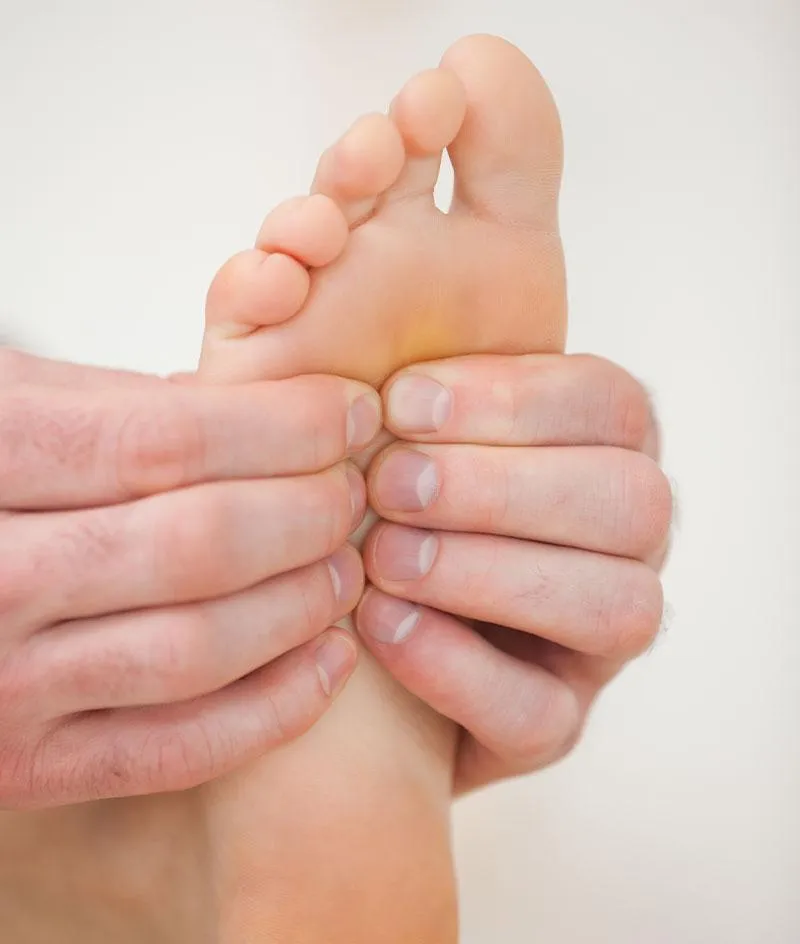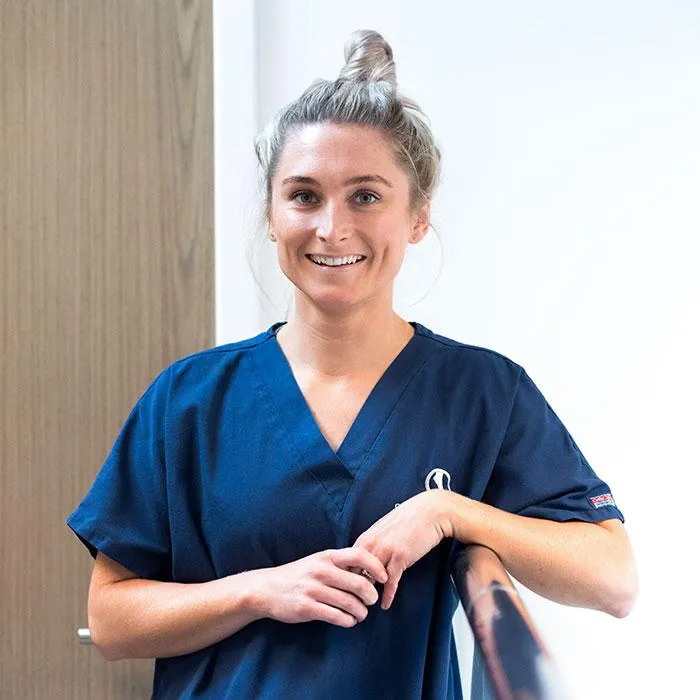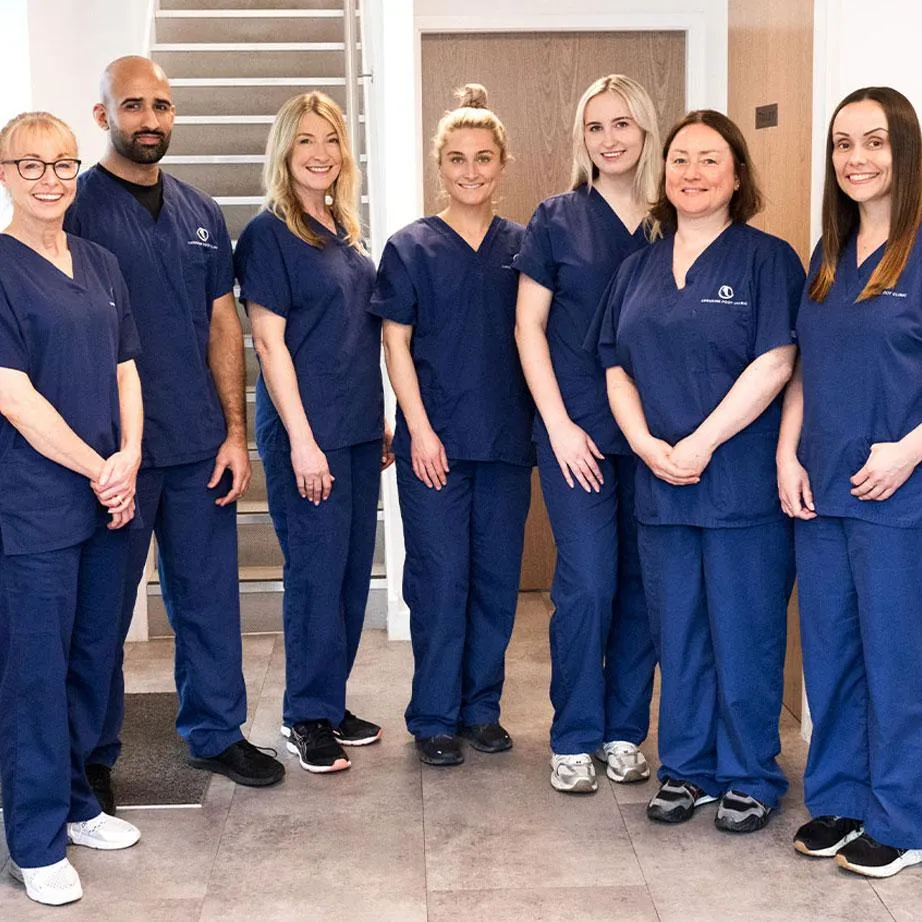
Athlete’s Foot & Fungal Skin Infection Treatment
Let Our Foot Specialists Help You Banish Itchy Feet For Good
re you no stranger to the discomfort of athlete's foot? Do you find your feet itching, burning, or peeling, especially after wearing damp socks or shoes for extended periods?
If you can relate to these challenges, you might be dealing with the persistent symptoms of athlete's foot. Fortunately, Cheshire Foot Clinic is here to provide the help you need on your journey toward relief and healthy, comfortable feet.



Have you ever wondered what causes Athlete's Foot?
Are you no stranger to the discomfort of athlete's foot? Athlete's foot (also known as Tinea Pedis) is a fungal skin infection that can lead to itchy, flaky, red, and painful skin, which can sometimes crack and bleed. It commonly occurs between the toes but can appear anywhere on the foot.
Fungal skin infections often affect the feet because fungus thrives in the dark, moist, and warm environment provided by shoes and socks. Some individuals are more prone to developing these infections. If left untreated, the infection can worsen, causing painful skin breaks and potentially spreading to the toenails.
Fortunately, Cheshire Foot Clinic is here to help. Our skilled podiatrists offer a range of effective treatments to relieve the symptoms of athlete's foot and restore the health of your feet. We will work with you to develop a customized treatment plan tailored to your unique needs.
Don't let athlete's foot hold you back any longer!
Contact us today to schedule an appointment with one of our experienced podiatrists and take the first step toward healthier, more comfortable feet.

Got a Question?
Ask Cheshire Foot Clinic And The Team

Who is most prone to getting Athlete's Foot?
The incidence of fungal infections, such as athlete's foot, is high across the population, but certain groups are more at risk than others. While anyone can contract athlete's foot, specific factors can increase your susceptibility to this common fungal infection.
Individuals with autoimmune diseases or diabetes are at a higher risk of developing athlete's foot due to their compromised immune systems, which make it harder to fight off infections.
Additionally, lifestyle and hygiene practices play a significant role. Walking barefoot in communal areas, such as gym locker rooms, swimming pools, or public showers, increases the likelihood of coming into contact with the fungus.
Failing to change your shoes and socks regularly, particularly if they become damp with sweat, creates an ideal environment for the fungus to thrive. Those who are prone to sweaty feet are especially vulnerable.
Athlete's foot is also highly contagious and can spread from person to person through direct contact. Sharing towels, shoes, or other personal items with someone who has the infection can easily transfer the fungus.
Understanding these risk factors can help you take proactive steps to prevent athlete's foot.
If you do contract the infection, early treatment is crucial to prevent it from worsening or spreading. At Cheshire Foot Clinic, we offer comprehensive care and effective treatments to help you manage and overcome athlete's foot, ensuring your feet stay healthy and comfortable.

What are the treatments available for Athlete's Foot?
Athletes foot does not usually resolve on its own therefore it is important to seek advice from your GP, Pharmacy or Podiatrist from the onset of symptoms.
Over-the-counter anti-fungal treatments will help get rid of the fungus and help prevent reoccurrence. In some cases a steroid cream or an oral anti-fungal treatment mav be prescribed.
How to prevent it:
Dry your feet thoroughly after a bath or shower, including in between the toes.
Wear clean socks daily
Change and clean footwear regularly
Don't walk barefoot - try to wear flip-flops in communal areas to reduce risk of infection
Avoid picking at skin as this can increase your risk or infection.
Patients frequently come to the clinic embarrassed by the appearance of their feet and one of the most frequent reasons for this is fungal infection of the skin and nails.
If you think you have a fungal skin infection, and it isn’t improving we can help you manage and treat this problem. Treatment will improve the appearance of the feet and may prevent the infection from spreading to affect your toenails.
8 Reasons To Choose Cheshire Foot Clinic
Professional, Friendly, and Knowledgeable: Our patients say that our dedicated team is professional, friendly, and knowledgeable. They are experts in their field and in creating an environment where you feel comfortable discussing your foot care needs.
Individual Treatment Plans: We understand that each person is unique, and so are their feet. That's why at Cheshire Foot Clinic, we tailor treatment plans to address your specific concerns. Whether you're dealing with a common issue or a rare condition, our personalised approach ensures you receive the care that suits your individual needs.
A Wide Range of Foot Care Services: Cheshire Foot Clinic offers a comprehensive foot care service to cater to diverse needs. From routine check-ups to advanced treatments, our clinic is well-equipped to handle most foot conditions. Whether you need preventive care or specialised interventions, we've got you covered.
Collectively Over 50 Years of Experience: Benefit from the wealth of experience our team brings to the table. With well over 50 years of combined expertise, Cheshire Foot Clinic guarantees professionals who have encountered and successfully addressed a wide spectrum of foot-related issues. Trust us to provide effective solutions based on our extensive knowledge and hands-on experience.
Full Assessment of All Our Patients: Every patient at Cheshire Foot Clinic undergoes a thorough and comprehensive assessment. We believe in leaving no stone unturned when it comes to understanding your foot health. This meticulous approach ensures that we identify underlying issues, enabling us to devise the most suitable treatment plans for optimal results.
Members of the Royal College of Podiatrists and HCPC Registered: Our commitment to excellence is reflected in our affiliation with the Royal College of Podiatrists. We are dedicated to upholding the highest standards of patient care.
Fully Equipped Treatment Rooms and Disabled Access: Cheshire Foot Clinic prioritises accessibility and comfort. Our fully equipped treatment rooms are designed to provide a seamless and efficient experience for our patients. We also ensure disabled access, ensuring that everyone, regardless of mobility challenges, can benefit from our exceptional foot care services.
Exceptional Patient-Centric Care: Our commitment to providing exceptional patient-centric care goes beyond professional expertise. The high recommendations from our patients stem from the genuine care and attention we invest in each individual.

From Consultation to Treatment
What to Expect at Your First Podiatry Visit
We're excited to see you at your appointment! We want to make sure you feel comfortable and well-informed, so don't hesitate to ask us any questions about our treatments, our clinic, or even our payment options. Our goal is to help you get back to living your life free of pain, so let's work together to make that happen!
Discuss your foot health goals
Complete foot examination
Discover your options
Start a custom treatment plan


Have Questions? One of Our Team Will Call You FREE of Charge

Fill in the form to request a Call From Our Team
One of our team members will call you for FREE and answer any questions or concerns you may have about your aches and pains.
Frequently Asked Questions About Athlete's Foot and Fungal Skin Infections of The Foot
What is athlete's foot?
Athlete's foot, also known as Tinea Pedis, is a common fungal infection that affects the skin of the feet. It typically occurs between the toes and can cause itchy, flaky, red, and painful skin that may crack and bleed.
How do I know if I have athlete's foot?
Common symptoms of athlete's foot include itching, stinging, and burning between the toes or on the soles of the feet. The skin may appear red, scaly, or cracked, and blisters or ulcers can sometimes develop.
How is athlete's foot diagnosed?
Athlete's foot is usually diagnosed based on the appearance of the affected skin. In some cases, a podiatrist may take a skin scraping to examine under a microscope or send it to a lab to confirm the presence of a fungal infection.
What causes athlete's foot?
Athlete's foot is caused by a group of fungi called dermatophytes. These fungi thrive in warm, moist environments, making the feet an ideal location for infection, especially when they are often enclosed in shoes and socks.
Who is at risk for athlete's foot?
Anyone can get athlete's foot, but certain factors increase the risk, including having a compromised immune system (such as with autoimmune diseases or diabetes), walking barefoot in communal areas, not changing shoes and socks regularly, and having sweaty feet.
How can I prevent athlete's foot?
To prevent athlete's foot, keep your feet clean and dry, change your socks and shoes regularly, avoid walking barefoot in public places, and use antifungal powders or sprays if you are prone to sweaty feet. Wearing breathable footwear can also help reduce moisture buildup.
Is athlete's foot contagious?
Yes, athlete's foot is highly contagious and can spread through direct contact with an infected person or by touching contaminated surfaces, such as floors, towels, or shoes.
What treatments are available for athlete's foot?
Treatment for athlete's foot typically includes antifungal creams, sprays, or powders available over the counter. In more severe cases, a doctor may prescribe stronger topical or oral antifungal medications.
How long does it take to get rid of athlete's foot?
With proper treatment, athlete's foot can usually be cleared up within a few weeks. However, it is important to continue treatment for the full recommended duration to prevent the infection from returning.
What should I do if my athlete's foot doesn't improve with over-the-counter treatments?
If your athlete's foot does not improve with over-the-counter treatments, or if it worsens, you should see a podiatrist. They can provide stronger medications and check for other conditions that may be contributing to your symptoms.
Can athlete's foot spread to other parts of my body?
Yes, if left untreated, athlete's foot can spread to other parts of the body, including the toenails, hands, and groin area. This makes early and effective treatment important.
How can I care for my feet to avoid fungal infections?
Maintain good foot hygiene by washing your feet daily with soap and water, drying them thoroughly, especially between the toes, and keeping your toenails trimmed. Wear breathable socks and shoes, and avoid sharing personal items like towels and footwear.
Please note that these FAQs provide general information and should not replace personalised advice from a qualified healthcare professional. It is important to consult with a trusted podiatrist to assess your individual case and determine the most suitable treatment plan for your fungal skin infection.
Where To Find Cheshire Foot Clinic

Cheshire Foot Clinic, 21A Tatton Street, Knutsford, WA16 6AE
There is a large car park opposite with designated disabled spaces closest to the clinic



